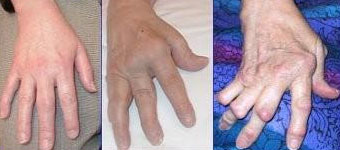Arthritis is a complicated disease, which affects the joints of the body. There are more than a hundred different described conditions, with osteoarthritis and rheumatoid arthritis being the two most common ones. Osteoarthritis involves degeneration of the synovial cartilage and bony overgrowth on the joint articulating surfaces. Rheumatoid arthritis on the other hand has an autoimmune origin, involving self-production of auto-antibodies in the body which circulates in the blood and can attack the joints which are deemed foreign by the immune defense system. Although osteoarthritis and rheumatoid arthritis have different causes and risk factors, they are often present with similar symptoms, such as constant joint pain. Both diseases can be debilitating and adversely affect your oral health if not managed accordingly.
What are the symptoms of osteoarthritis and rheumatoid arthritis?
Besides constant joint pain as mentioned above, affected individuals can also experience stiffness, swelling, deformation or disfiguration of the affected joints. Crepitus is also a common sign where the joints make a grating noise when in function. There can also be weakening or wasting of muscles in the limbs due to lack of usage of the affected joints. Osteoarthritis usually only affects joints that are frequently used and loaded through daily wear and tear while rheumatoid arthritis tend to affect symmetrical joints due to the autoimmune nature of the disease.
How can this affect your oral health?
There can be direct effects where the joints in the jaw, or more commonly referred to as the temporomandibular joint are also affected by arthritis. This can lead to difficulty opening and affects eating and chewing ability. Indirect effects of arthritis usually involve the quality of life of an individual which can be significantly compromised. Individuals with arthritis though can be independent, some may be very debilitated and require total dependence and special care.
There is often reduced level of function associated with restricted joint movements. The hands being a commonly affected site means that individuals will have decreased manual dexterity skills, which can compromise their oral hygiene in terms of tooth brushing and flossing. This if left unmanaged can lead to oral problems such as dental caries, gingivitis and periodontitis. There has been significant evidence demonstrating increased incidence of periodontitis or gum diseases in patients with arthritis. Thus it is recommended for affected patients to use a large handled toothbrush in which they can grip much better, or get an electric toothbrush to improve oral health. Flossettes and large floss holders such as ‘hummingbird’ can be obtained from your pharmacy to remove plaque in between teeth surfaces.
How does arthritis affect your dental treatment?
It is important to notify your dentist if you have arthritis before commencing any dental treatment as it can have a significant effect on treatment planning. The general recommendation for patients with arthritis is to be seen in late morning or early afternoon appointments, as the condition tends to improve throughout the day. It is also wise to request for small separate appointments rather than trying to get everything done in one long appointment whenever practicable to prevent the need of lying down in the same position for extended periods. Neck and leg support with pillows can also be requested when available to improve comfort.
If you have previously undergone surgery to replace arthritic joints, it is important to inform your dentist about it because prosthetic joints can be prone to infection especially if it is newly placed. It is generally advisable to avoid unnecessary and invasive dental treatment during the first six months after joint replacement surgeries. Hence it is sensible to seek proper dental care prior to the surgeries to ensure your oral health is at its best. Should you require emergency dental treatment during the first six months post-surgery, the dentist may decide to prescribe you a prophylactic course of antibiotics to minimize oral bacteria from traveling through the blood stream to the prosthetic joints as this can lead to infections and possible failure of the joints. However, infection from such route is rare.
You must also provide your dentist with all the details of your medications as this again, can have implications on your dental treatment and it may require extra intervention. Aspirin, for example can cause more bleeding during dental extractions. However, it is prudent to not stop your prescribed medications without advice from your doctor or dentist because although it may have minor risks associated with dental treatment, there are usually greater risks involved with ceasing medications without seeking prior medical recommendations. It is essential to discuss any query with your dentist to prevent misunderstandings and inappropriate management.


